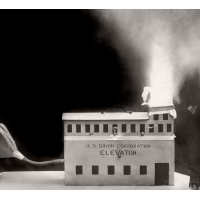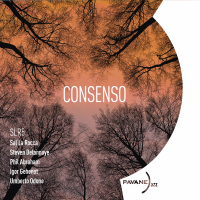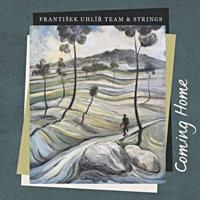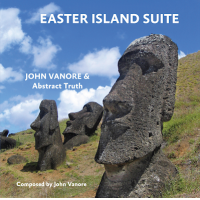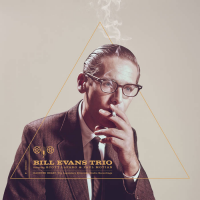Home » Jazz Articles » Multiple Reviews » Quincy Jones / Onzy Matthews / Woody Herman: Big Bands D...
Quincy Jones / Onzy Matthews / Woody Herman: Big Bands Done the Mosaic Way
 Quincy Jones
Quincy Jones The Quincy Jones ABC/Mercury Big Band Jazz Sessions
Mosaic Records
2007
In 2008, the legacy of Quincy Jones is already the stuff of legend. Even those with a casual interest in music know him as the force behind some of the greatest pop records of the past 25 years, especially the iconic Michael Jackson albums Off the Wall (Epic, 1979) and Thriller (Epic, 1982). Older listeners are also likely to recall his time spent at Mercury Records, which brought with it tunes on the hit parade such as Lesley Gore's "It's My Party." Fewer know intimately the big band sounds that first put him on the map, the likes of which have now been collected in this superb five-disc anthology.
First making the jazz scene as a trumpeter, Jones spent time overseas studying with Nadia Boulanger and getting his feet wet by writing charts for the big band of Harry Arnold. His first major statement, from 1956, This is How I Feel About Jazz, opens up the set and finds Jones in some rather heady company. Numbers like "Stockholm Sweetnin'" and "Sermonette" announce this budding bandleader's skills in updating the big band cannon with panache. Fast forward three years and we find Jones entrenched in his tenure with Mercury Records. Sessions from the spring and summer of 1959 would be put out piecemeal on the albums Birth of a Band, Birth of a Band Vol.2, and Quincy Plays for Pussycats. By this time, Jones had streamlined his approach. The numbers are shorter, often under three minutes, and often come from the popular canon, case in point being "Syncopated Clock," "The Hucklebuck," and "Choo Choo Ch' Boogie."
By the fall of 1959, Jones had assembled an all-star ensemble and began rehearsing for the musical Free and Easy. With the help of arrangers Bill Potts, Al Cohn, Ralph Burns, and Ernie Wilkins he quickly put together the ten tracks that would comprise the album The Great Wide World of Quincy Jones. Then it was off to Europe with the Free and Easy company and a well-documented period of despair after the show quickly closed and left Jones holding the bag. Nonetheless, a session in Paris produced the album I Dig Dancers, a fine collection of pieces, including the catchy "Pleasingly Plump" and the ubiquitous "The Midnight Sun Will Never Set."
1961, a banner year for Jones, brought with it no less than two live concert recordings and a new studio date released on the budding Impulse! label. By this point, the Jones band could boast some of the finest soloists around, including trumpeters Freddie Hubbard and Benny Bailey, saxophonists Phil Woods and Jerome Richardson, and trombonist Curtis Fuller. The rarest of these recordings, a live show in Zurich, was released on the album Curtis Fuller and the Jazz Ambassadors. Although the sound is rough and the ensembles often on the jagged side, for sheer excitement, it's hard to beat At Newport '61. Signature tunes like "Meet Benny Bailey" and "Banja Luka" bring out the best in this band of talented soloists.
Let us not forget the December 1961 sessions that produced The Quintessence, one of Jones' finest moments. In the material and arrangements, there seems to be more of Jones in this music than anything since This is How I Feel About Jazz. Lush numbers like the title track and "For Lena and Lennie" turn up the goose bump factor and "Robot Portrait" and "Hard Sock Dance" swing hard with real attitude. This set concludes with three tracks from the end of 1964. But by that time, Jones was onto the next phase of his career, leaving the big bands behind.
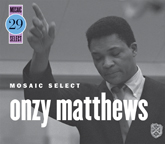 Onzy Matthews
Onzy Matthews Mosaic Select 29
Mosaic Records
2007
Only Mosaic could be daring enough to take a chance on reissuing the totally obscure musings of composer and arranger Onzy Matthews. A West Coast mainstay for a brief period of time, Matthews is known for the original charts he contributed to albums by saxophonist Curtis Amy and singers Lou Rawls and Esther Phillips. While working at Capitol Records, he had occasion to record two albums under his own name, which are featured here. Upping the ante even more, it turns out that Matthews left a good deal of music in the vault and of the 51 cuts included in this set, a full 29 of them have never been heard before.
The first tracks come from February of 1963 and they take in a wide range of influences. At this time, bossa nova was the new rage and many of the numbers speak in this genre, although it's staggering how skillfully Matthews manages to avoid the obvious both in his arrangements and original material. Pity that this music never saw the light of day until now. Also worth noting is the further exposure these dates give to the sadly under appreciated talents of trumpeter Dupree Bolton and pianist Horace Tapscott.
Fast forward a year and we hear the music gathered for the highly coveted Blues With a Touch of Elegance. A mix of standards and originals, the program flows effortlessly like a great live set and even the most casual listener should be able to detect Matthews' talents for finding new routes to a familiar destination, namely the blues. As a bonus, previously unissued takes find a large ensemble with Groove Holmes on organ tackling four pieces from the album. The results are not unlike Gerald Wilson's Pacific Jazz dates with Holmes or organist Jimmy Smith's Verve sessions with Oliver Nelson.
Over the course of three sessions spread out over an eleven-month period, Matthews would record the pieces that would comprise his next album, Sounds for the '60s. A bit more on the commercial side, Matthews again shows how apt he was at taking even the skimpiest material and making the most out of it. Numbers like "People," "Put on a Happy Face," and "Moon River" have been done time and time again, but somehow manage to take on a fresh appearance thanks to these fine charts. Needless to say, anyone even remotely interested in large ensemble jazz will find this three-disc set to be a treasure trove of undiscovered gems.
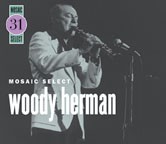 Woody Herman
Woody Herman Mosaic Select 31
Mosaic Records
2008
Although his career spanned many years and he maintained a high level of excellence throughout most of it, few would argue that Woody Herman put together his best unit in the mid sixties while he was under contract to the Phillips label. Unfortunately, most of this music has been largely unavailable and only the title Woody Herman-1963 made it to CD prior to Mosaic's rescue of this iconic cannon. This is the band that ignited with a fervor that clearly inspired Herman to play better than he had in years. The personnel really says it all, namely talents such as trumpeter Bill Chase, tenor saxophonist Sal Nistico, baritone saxophonist Nick Brignola, pianist Nat Pierce, and drummer Jake Hanna.
This three-disc set divides itself nicely into two halves. There are two studio sessions (1963 and 1964) and the live tracks culled from a May 1963 appearance at Basin Street West and released as the albums Encore and Woody's Big Band Goodies. Nat Pierce contributes some of his best numbers, such as "Pour House Blues" and "Dr. Wong's Bag." We also get the Bill Chase flag-wavers "El Toro Grande" and "Camel Walk." It's also a real treat to hear Herman successfully revisit his past through "Bijou" and "Apple Honey." Hats off to Mosaic for finally bringing this music into the digital age. The wait had been unbearable for most Hermanphiles!
Tracks and Personnel
The Quincy Jones ABC/Mercury Big Band Sessions CD1: Walkin'; A Sleeping Bee; Sermonette; Stockholm Sweetnin'; Evening In Paris; Boo's Bloos; The Quintessence; Robot Portrait; Little Karen; Straight, No Chaser; For Lena And Lennie; Hard Sock Dance; Invitation; The Twitch; CD2: The Birth Of A Band; Moanin'; I Remember Clifford; Along Came Betty; Tickle Toe; Happy Faces; Whisper Not; The Gypsy; A Change Of Pace; Tuxedo Junction; Daylie Double; Moanin' (alternate version); Happy Faces (alternate take); After Hours; Choo Choo Ch'Boogie; The Hucklebuck; The Midnight Sun Will Never Set; The Preacher; Marching The Blues; Blues In The Night; Syncopated Clock; CD3: Lester Leaps In; Ghana; Caravan; Everybody's Blues; Cherokee; Air Mail Special; They Say It's Wonderful; Chant Of The Weed; I Never Has Seen Snow; Eesom; Pleasingly Plump; G'wan Train; Moonglow; Tone Poem; You Turned The Tables On Me; Chinese Checkers; Love Is Here To Stay; The Midnight Sun Will Never Set; Trouble On My Mind; A Sunday Kind Of Love; Parisian Thoroughfare; Pleasingly Plump (first version); G'wan Train; CD4: Solitude; Stolen Moments; Bess, You Is My Woman Now; Moanin'; Air Mail Special; Banja Luka; Billie's Bounce; Scrapple From The Apple; Blue 'N Boogie; CD5: Ghana; Meet B.B.; The Boy In The Tree; Evening In Paris; Air Mail Special; Lester Leaps In; G'wan Train; Banja Luka; I Had A Ball; Almost; Addie's At It Again.Collective Personnel: Art Farmer, Nat Adderley, Ernie Royal, Bernie Glow, Joe Wilder, Jerome Kail, Clyde Reasinger, Clark Terry, Joe Newman, Thad Jones, Al De Risi, Freddie Hubbard, Snooky Young, Jimmy Maxwell, Lee Morgan, Nick Travis, Lennie Johnson, Benny Bailey, Floyd Standifer, Rolf Ericson, Paul Cohen, Jimmy Maxwell, Jimmy Nottingham, Joe Newman, John Bello: trumpet; Jimmy Cleveland, Urbie Green, Frank Rehak, Curtis Fuller, Billy Byers, Melba Liston, Paul Faulise, Rod Levitt, Quentin Jackson, Ake Persson, Wayne Andre, David Baker, Britt Woodman, Paul Faulise, Kai Winding: trombone; Julius Watkins, Jimmy Buffington, Earl Chapin, Ray Alonge: French horn; Gene Quill, Phil Woods, Frank Wess, Oliver Nelson, Porter Kilbert, Joe Lopes, Jerry Dodgion: alto sax; Herbie Mann, James Moody: flute and sax; Zoot Sims, Lucky Thompson, Bunny Bardach, Eric Dixson, Budd Johnson, Sam "The Man" Taylor, Benny Golson, Zoot Sims, Roland Kirk: tenor sax; Jack Nimitz, Jerome Richardson, Danny Bank, Sahib Shihab, Pat Patrick, Pepper Adams: baritone sax; Milt Jackson: vibes; Hank Jones, Billy Taylor, Bobbby Scott, Patti Bown: piano; Charles Mingus, Paul Chambers, Buddy Catlett, Milt Hinton, Ray Brown, Art Davis, Bob Cranshaw: bass; Kenny Burrell, Les Spann: guitar; Charlie Persip, Bill English, Stu Martin, Jimmy Johnson, Jimmy Crawford, Osie Johnson, Sam Woodyard, Don Lamond, Joe Harris, Art Blakey: drums; Quincy Jones: arranger/conductor.
Mosaic Select 29: Onzy Matthews
CD1: A New Samba For Margo; A Second Chance; Bossa Nova Blue; Little Boat (O Barquinho); Lover Man; Ho Ba La La; Almost In Your Arms; Canadian Sunset; Non-Stop Jazz Samba; Without Your Love; Bossa Nova In Minor; One Note Samba; Lilies Of The Field; Joe And I; Midnite Lament; CD2: Blues With A Touch Of Elegance: Flamingo; Pensive; Feels Like I've Got The Blues; Dallas Blues; Somethin's Cookin'; I Should Care; Blues Non-Stop; I Cover The Waterfront; Satin Doll; Burnin'; Blues Non-Stop (first version); I Cover The Waterfront (first version); Dallas Blues (first version); Soemthin's Cookin' (first version); Lefty Louie Blues; Blues Non-Stop; CD3: Ray-On Blues; You'll Know The First Time; Moon River; Like Someone In Love; Ballad For Orchestra; I Left My Heart In San Francisco; A Set For Gillette; Spring Is Here; Down In My Soul; Make Someone Happy; People; Play Me Some Blues; White Gardenia; Lilies Of The Field; Mexicali Brass; Blues For The Reverend; Put On A Happy Face; I Thought About You; Guess I'd Better Go Back Home.
Collective Personnel: Bobby Bryant: trumpet and fluegelhorn; Gabe Baltazar: alto sax, flute; Onzy Matthews: piano; Al Viola, Julian "Bud" Matlock: guitars; Jim Crutcher:bass; Jerry MacKenzie: drums; Horace Tapscott, Joe Vasquez, Dike Hude: trombones; Elliott Fisher, Jim Getzoff, Jerry Vinci, Paul Shure, violins; Ray Kramer, Adolph Frezin, cellos; Bob Rolfe, Dupree Bolton: trumpets; Lou Blackburn, Dick Leith: trombones; Gabe Baltazar: alto sax; Curtis Amy: tenor sax; Jay Migliori: baritone sax; Bud Brisbois, Bob Rolfe, Dalton Smith, Freddie Hill, Walter Williams: trumpets; Ron Smith: bass trombone; Sonny Criss, Joe Maini: alto saxophones; Curtis Amy: soprano sax, tenor sax; Teddy Edwards, tenor sax; Rene Hall, Ray Crawford: guitars; Earl Palmer: drums, Lou Rawls: tambourine; Earl Anderza: alto sax; Hadley Caliman: tenor sax; Roosevelt Wardell: piano; Clarence Jones: bass; Chuck Carter: drums; Sid Miller, Clifford Scott: alto saxophones; Curtis Amy, Teddy Edwards, Clifford Solomon: tenor saxophones;Richard Groove Holmes: organ; Chiz Harris, drums; Harry Edison, Lee Katzman, Melvin Moore, John Anderson, Bob Rolfe: trumpets; Dave Wells: bass trumpet, trombone; Pete Myers, Dick Leith: trombones; Herb Ellis: guitar; Dal Carlos: congas; Bob Knight: bass trombone; Don Peake: guitar; Larry Knechtel: electric bass; Sharky Hall: drums; Lloyd Morales: percussion.
Mosaic Select 31: Woody Herman
CD1: Mo-lasses; Blues For J.P.; Don't Get Around Much Anymore; Tunin' In; Sister Sadie; Sig Ep; It's A Lonesome Old Town (When You're Not Around);Camel Walk; Moon River; Hallelujah Time; Deep Purple; Jazz Hoot; A Taste of Honey; Satin Doll; After You've Gone; The Strut; My Wish; CD2: That's Where It Is; Watermelon Man; Body And Soul; Better Get It In Your Soul; Jazz Me Blues; El Toro Grande; Days Of Wine And Roses; Caldonia; Wailin' In The Woodshed; The Good Earth; Sidewalks Of Cuba; I Can't Get Started; Bijou; Apple Honey; CD3: The Good Life, Bedroom Eyes; The Things We Said Today; Just Squeeze Me; What Kind Of Fool Am I?; Dr. Wong's Bag; Everybody Loves Somebody; Wa-Wa Blues; Dear John C; Blue Monk; You Dirty Dog; Pour House Blues.
Collective Personnel: Bill Chase, Billy Hunt, Danny Nolan, Gerry Lamy, Ziggy Harrell, Dave Gale, Gerry Lamy, Paul Fontaine, Larry Ford, Dusko Goykovich: trumpet; Kenny Wenzel, Phil Wilson, Henry Southall, Jack Gale, Phil Wilson, Eddie Morgan, Bob Stroup, Henry Southall: trombone; Woody Herman: clarinet, alto sax, vocals; Sal Nistico, Larry Cavelli, Gordon Brisker, Carmen Leggio, Jack Stevens, Andy McGhee, Gary Klein, Raoul Romero: tenor sax; Gene Allen, Nick Brignola, Tom Anastas: baritone sax; Nat Pierce: piano; Chuck Andrus: bass; Jake Hanna: drums; Joe Carroll: vocals.
Tags
PREVIOUS / NEXT
Support All About Jazz
 All About Jazz has been a pillar of jazz since 1995, championing it as an art form and, more importantly, supporting the musicians who make it. Our enduring commitment has made "AAJ" one of the most culturally important websites of its kind, read by hundreds of thousands of fans, musicians and industry figures every month.
All About Jazz has been a pillar of jazz since 1995, championing it as an art form and, more importantly, supporting the musicians who make it. Our enduring commitment has made "AAJ" one of the most culturally important websites of its kind, read by hundreds of thousands of fans, musicians and industry figures every month.








